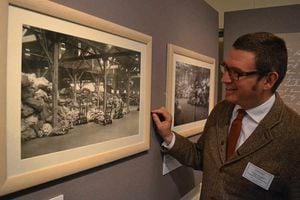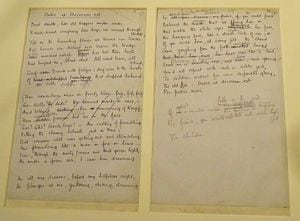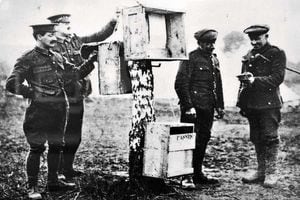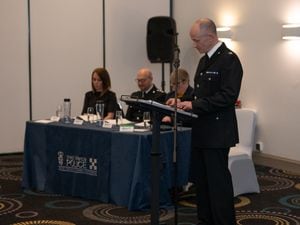Original of famous Wilfred Owen poem on show in Shropshire
An original manuscript of the most famous poem by Great War poet Wilfred Owen is a highlight of a poignant new exhibition in Shropshire which tells the story of an often overlooked aspect of the conflict – the role of the postal service and postal workers.

The handwritten copy of Dulce et Decorum est, complete with crossings out and amendments, is showcased along with an original manuscript of a lesser-known Owen poem, called The Letter, in the exhibition called Last Post, which is a partnership between Ironbridge Gorge Museum Trust and the British Postal Museum & Archive.
The free exhibition is at the Coalbrookdale Gallery, next to Enginuity in Coalbrookdale. It was opening today and will run until March 27, 2015.
The exhibition is part of commemorations marking the centenary of the outbreak of the Great War and the poems by Owen, who was killed in action just days before the end of the conflict, have been loaned by the British Library.

Dr Matt Thompson, senior curator of the Ironbridge Gorge Museum Trust, said: "Dulce et Decorum Est, which everybody will have studied at school, is a hugely important piece of literature. There are several versions in existence as he redrafted and revised the poem. It's an incredibly powerful element to the exhibition and to have that here, in his hand, is something.
"Wilfred Owen was Shropshire-born and it's fantastic to be able to make that very strong link between Shropshire and this national and international story.
"It's an unusual exhibition with some very powerful stories. If you think in terms of the battlefield will, for instance, this was the kind of letter nobody wanted to receive, scrawled on a piece of paper with a stub of a pencil by a soldier before going over to the top, and beginning 'in the event of my death...' There are examples of those.
"We have some specific Shropshire elements. The story is really all about the role of the postal service in the First World War, but also the post office workers who joined up. There was a whole regiment – the Post Office Rifles.

"It tells of the role of post office communications in the war, of those working in the postal service and of those who signed up. We have a series of panels which have all these stories represented and some really startling images which people will not necessarily have seen before in books because of their very specific nature. We have some really nice hand-tinted lantern slides. We think of the past in terms of black and white. It isn't the case. While these images are in a sense ghostly, they bring that element of reality."
The Ironbridge museum has been working with the postal museum for about five years, and there is already a Museum of the Post Office in the Community at Blists Hill Victorian Town, which Dr Thompson described as a "hidden gem".
Chris Taft, of the British Postal Museum & Archive, said: "The story of the role that the post office played in the First World War hasn't been that widely told. It's our job really to tell that story."
The majority of the material displayed was from the post museum's collection, he said.
He said the original manuscript of Dulce et Decorum Est had been initially sent by Owen to his mother.
Mr Taft said: "The other poem, called The Letter, is a nice poem told from the perspective of a soldier who writes back home to his wife and, during the writing of the letter, there are explosions and he is mortally wounded.
"At the end of the letter he asks his comrade to take over the writing of the letter for him. It's a very touching poem."
Among the items in the display are letters sent home by soldiers, a copy of the original telegram about the cessation of hostilities in 1918, various artefacts, and a field telephone, together with rare images both from the trenches, with soldiers writing and receiving mail, and from the Home Front.
Dulce et Decorum est by Wilfred Owen
Bent double, like old beggars under sacks,
Knock-kneed, coughing like hags, we cursed through sludge,
Till on the haunting flares we turned our backs
And towards our distant rest began to trudge.
Men marched asleep. Many had lost their boots
But limped on, blood-shod. All went lame; all blind;
Drunk with fatigue; deaf even to the hoots
Of tired, outstripped Five-Nines that dropped behind.
Gas! Gas! Quick, boys!---An ecstasy of fumbling,
Fitting the clumsy helmets just in time;
But someone still was yelling out and stumbling,
And flound'ring like a man in fire or lime...
Dim, through the misty panes and thick green light,
As under a green sea, I saw him drowning.
In all my dreams, before my helpless sight,
He plunges at me, guttering, choking, drowning.
If in some smothering dreams you too could pace
Behind the wagon that we flung him in,
And watch the white eyes writhing in his face,
His hanging face, like a devil's sick of sin;
If you could hear, at every jolt, the blood
Come gargling from the froth-corrupted lungs,
Obscene as cancer, bitter as the cud
Of vile, incurable sores on innocent tongues,---
My friend, you would not tell with such high zest
To children ardent for some desperate glory,
The old Lie: Dulce et decorum est
Pro patria mori.





